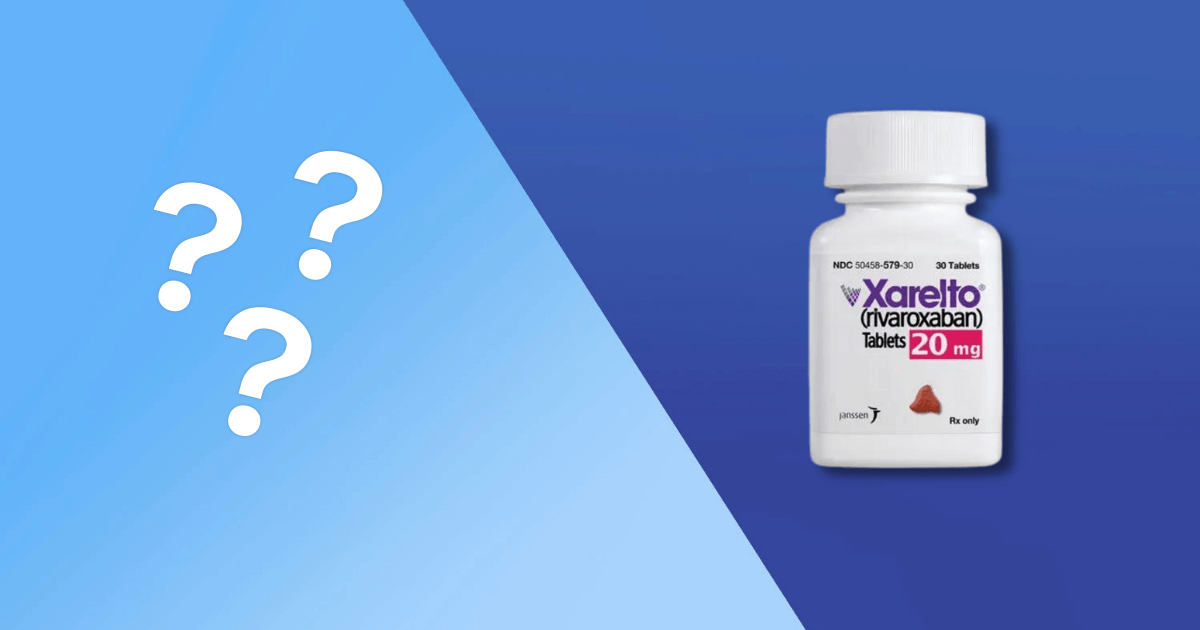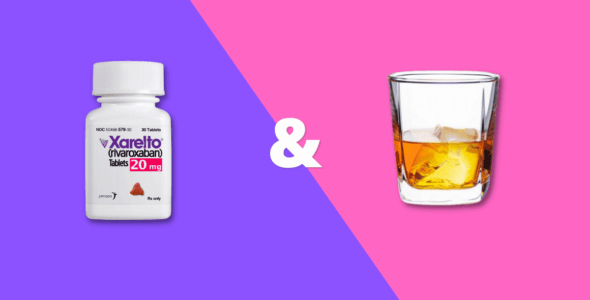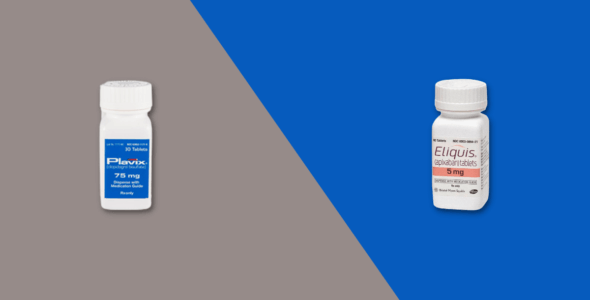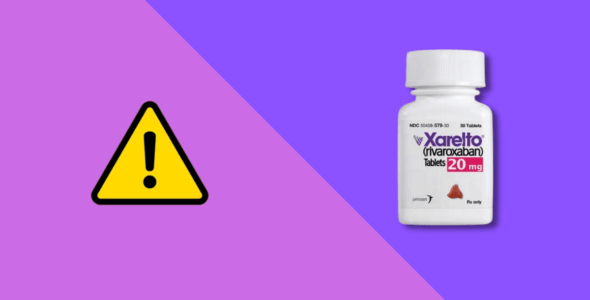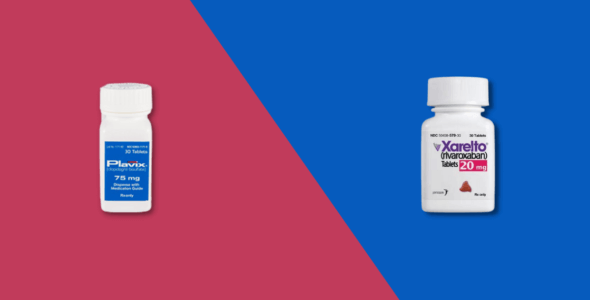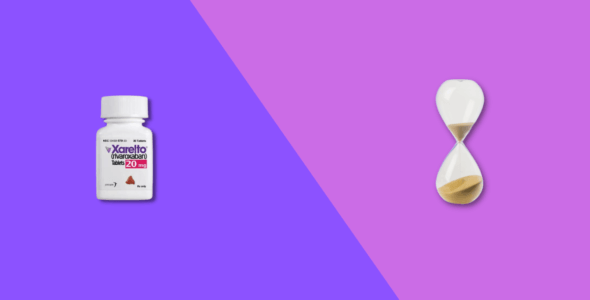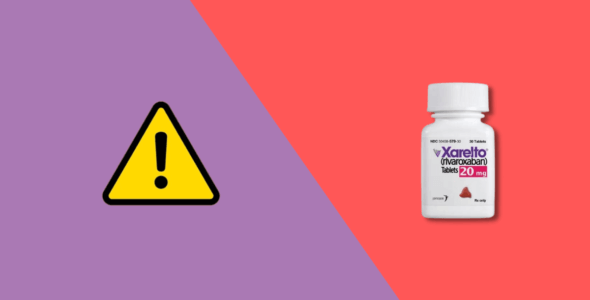Comparing Xarelto alternatives: which other blood thinners can I take?
Table of contents
Direct oral anticoagulants (DOACs) are blood thinner prescription drugs that have a rapid onset of action and require no blood monitoring. Xarelto is an FDA-approved drug in this category but Xarelto alternatives are available if you and your healthcare professional agree it’s needed. Let’s take a look at these.
What is Xarelto?
Xarelto contains the active ingredient rivaroxaban. It is a direct oral anticoagulant and works by blocking factor Xa in the blood clotting process.
It comes in tablet form and is taken by mouth. Xarelto is available in four strengths: 2.5 mg, 10 mg, 15 mg, and 20 mg. Your dosage will vary based on what you are being treated for. Xarelto is manufactured by Janssen Pharmaceuticals.
What conditions are treated with Xarelto?
Xarelto is indicated for the following conditions:
- Reduce the risk of stroke and systemic embolism in patients with nonvalvular atrial fibrillation (AFib, or irregular heartbeat)
- Prevent deep vein thrombosis (DVT) in the legs and pulmonary embolism (PE) in the lungs of patients who have had hip or knee replacement surgery
- Treatment of deep vein thrombosis (DVT)
- Treatment of pulmonary embolism (PE)
- Reduce the risk of blood clots happening again in people who continue to be at risk for DVT or PE after receiving treatment for blood clots for at least 6 months
- Prevention of DVT, which may lead to PE in patients undergoing knee or hip replacement surgery
- Prevention of blood clots in certain people hospitalized for an acute illness and after discharge, who are at risk of getting blood clots due to the loss of or reduced ability to move around, and other risks for getting blood clots, and who do not have a high risk of bleeding
Xarelto can also be used with aspirin to:
- Lower the risk of dangerous cardiovascular events such as death, heart attack, and stroke in patients with chronic coronary artery disease (CAD) or peripheral artery disease (PAD)
- Reduce the risk of a serious reduction in blood flow to the legs, stroke, major amputation, and heart problems in patients with PAD (peripheral artery disease, a condition where the blood flow to the legs is reduced). Xarelto is not for use in people with artificial heart valves
What are the common side effects of blood thinners?
Anticoagulant medications can cause an increased risk of bleeding. The most common side effect of blood thinners include symptoms such as:
- Nose bleeds
- Heavier than normal menstrual bleeding
- Gastrointestinal bleeding
- A cut that does not stop bleeding
- Bruising
- Increased bleeding risk
Get your blood thinner medication for only $49 per month
Get StartedWhat are the alternative meds to Xarelto?
Eliquis
Eliquis contains the active ingredient apixaban. It is a direct oral anticoagulant that works by blocking factor Xa just like Xarelto. Factor Xa produces thrombin, a fundamental component in the clotting process. By blocking factor Xa, Eliquis can reduce the production of clots.
Eliquis is available in two strengths: 2.5 mg and 5 mg. Your dosage will vary based on what you are being treated for. Eliquis is manufactured by Bristol-Myers Squibb.
Eliquis is indicated for the following conditions:
- Reduce the risk of stroke and systemic embolism in patients with non-valvular atrial fibrillation (AFib, or irregular heartbeat known as an arrhythmia)
- Prevent deep vein thrombosis (DVT) in the legs and pulmonary embolism (PE) in the lungs of patients who have had hip or knee replacement surgery
- Treatment of deep vein thrombosis (DVT) in the legs
- Treatment of pulmonary embolism (PE) in the lungs
- Reduce the risk of recurrent DVT and PE
Pradaxa
Pradaxa is a blood thinner (anticoagulant) medication prescribed to adults to lower the chance of blood clots forming. Specifically, it’s used to:
- Lower the risk of blood clots that can cause strokes in people who have a medical condition called atrial fibrillation
- To treat and prevent blood clots forming in veins in the legs (deep vein thrombosis) or lungs (pulmonary embolism)
- To help lower the risk of blood clots forming in veins in the legs (deep vein thrombosis) or lungs (pulmonary embolism) of people who’ve had hip replacement surgery
Pradaxa can be taken to treat existing blood clots and to reduce the chances of blood clots forming. It works by interrupting a step in the blood clotting process. You take Pradaxa as an oral capsule, usually twice a day.
The active ingredient in Pradaxa is called dabigatran. It’s a blood thinner (anticoagulant) that stops your blood from clotting. Your blood clots by going through a complex chemical reaction with multiple steps. Some steps of this reaction use enzymes to help change your blood from a liquid to a gel. One of these enzymes is called thrombin.
Dabigatran works by blocking thrombin. When you swallow Pradaxa, molecules of dabigatran are absorbed in your blood, where they bind to thrombin. This stops thrombin from working and blocks a step of the clotting process.
Brilinta
Brilinta is a medication taken to reduce the risk of heart attacks, strokes, and death caused by blood clots. It’s prescribed to adults who:
- Have previously had a heart attack
- Have coronary artery disease (CAD) and who are at a high risk of having a heart attack or a stroke
- Have acute coronary syndrome (ACS)
- Have ACS and who have been treated with a stent
If you have CAD, ACS, or have a stent due to ACS, you may be at a greater risk of blood clots forming, and your doctor may prescribe Brilinta to you. Brilinta helps to stop your blood clotting, reducing your risk of a heart attack or stroke.
You take Brilinta as a tablet, that you swallow with water. Your doctor will decide upon your dose and how often you take your Brilinta.
The active ingredient in Brilinta is called ticagrelor, which reduces the risk of your blood clotting and causing a heart attack or a stroke. It works on the platelets in your blood, which are the substances that cause your blood to thicken and clot. Ticagrelor attaches to areas on the surface of your platelets called receptors. This stops them from being able to stick together and start the process that causes clotting.
Warfarin
Warfarin (Coumadin) is the oldest and most widely used blood thinner and requires regular blood tests to measure how fast your blood clots using the INR (International Normalized Ratio).
Warfarin works by decreasing the clotting ability of the blood. It is used to prevent blood clots from forming or growing in size in your blood and blood vessels.
It is prescribed for people:
- With certain types of irregular heartbeat
- With prosthetic (replacement or mechanical) heart valves
- Who have suffered a life-threatening heart attack
- To treat or prevent venous thrombosis
- To treat or prevent pulmonary embolism
Plavix
Plavix is a brand-name prescription drug containing the active ingredient clopidogrel. Clopidogrel is a platelet inhibitor used to prevent cardiovascular events such as heart attack and stroke.
Plavix can be given to people who:
- Have acute coronary syndrome (ACS)
- Have had a heart attack or stroke in the past
- Have peripheral artery disease (PAD)
Plavix is given in combination with daily aspirin.
Savaysa
Savaysa is a brand-name drug of edoxaban, an anticoagulant that works by blocking certain clotting proteins in your blood. Edoxaban is used to prevent serious blood clots from forming due to a certain irregular heartbeat (atrial fibrillation). It is also used to treat certain blood clots e.g. deep vein thrombosis or pulmonary embolus.
Is there a cheaper alternative to Xarelto?
Currently, Xarelto generic is not available in the United States. However, there are several cheaper alternatives to Xarelto available. Warfarin, known by the brand names Coumadin and Jantoven, is a comparable generic drug that can cost as little as $5 per month. Speak with your healthcare provider to find out if Warfarin is medically appropriate for you.
Final word
Some medicines can cause drug interactions with blood-thinning drugs and cause serious problems. Tell your healthcare provider about all the medicines you take. This includes over-the-counter medicines, supplements like vitamin K, minerals, or herbal supplements. Medical advice from a cardiologist or other healthcare professional must be taken when changing medications from one drug to another.
Medically reviewed
A medical professional has reviewed this article.


Jamie Winn, PharmD
Jamie Winn, PharmD
Dr. Jamie Winn received his Doctor of Pharmacy in 2002 from the University of South Carolina College of Pharmacy, Columbia, SC. Jamie is a medical reviewer for NiceRx.

